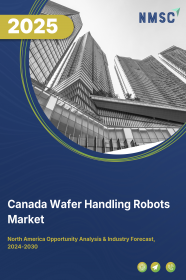
Canada Wafer Handling Robots Market by Product Type (Vacuum Wafer Handling Robots and Atmospheric Wafer Handling Robots), by Number of Arms (Single Arm and Dual Arm), by Robot Type (Linear Robots, SCARA Robots, Articulated Robots, Cylindrical Robot, and Others), by Operation (Motor Driven and Belt Driven), by Installation (Free Standing and Integrated), by End Use (Integrated Device Manufacturer (IDM) and Foundries) – Opportunity Analysis and Industry Forecast, 2024–2030
Industry: ICT & Media | Publish Date: 15-Feb-2025 | No of Pages: 169 | No. of Tables: 132 | No. of Figures: 97 | Format: PDF | Report Code : IC2077
US Tariff Impact on Canada Wafer Handling Robots Market
Trump Tariffs Are Reshaping Global Business
Canada Wafer Handling Robots Market Overview
The Canada Wafer Handling Robots Market size was valued at USD 5.4 million in 2023, and is predicted to reach USD 14.6 million by 2030, at a CAGR of 15.4% from 2024 to 2030. Also, the U.S. wafer handling robots market size was 112.0 units in 2023, and is predicted to reach 425.0 units by 2030, with a CAGR of 20.0% from 2024 to 2030.
A wafer handling robot represents a specialized robotic solution designed to streamline the complex procedures inherent in semiconductor manufacturing. These robots demonstrate exceptional proficiency in executing precise movements and positioning tasks with fragile semiconductor wafers. Their significance lies in their pivotal role in the creation of top-tier integrated circuits and microelectronic devices.
Operating within pristine cleanroom environments, they incorporate a diverse range of end effectors, sensors, and vision systems to securely grasp, inspect, and manipulate wafers, all while mitigating the risks of damage or contamination. By seamlessly integrating with other fabrication equipment, these robots not only boost operational efficiency and minimize errors but also foster the consistent production of cutting-edge semiconductor technologies that power an extensive array of contemporary devices.
Increasing Adoption of Electric Vehicles (EVs) Propel the Growth of the Market
The increasing adoption of electric vehicles (EVs) in Canada, driven by stringent government regulations and initiatives, directly impacts the demand for advanced manufacturing technologies in the EV industry, including wafer handling robots. As Canada aims to significantly reduce greenhouse gas emissions by 2035, focusing on zero-emission vehicles, the automotive sector is shifting towards EV production. This shift necessitates producing various components, including semiconductor devices used in EVs, which, in turn, requires advanced manufacturing processes and automation. The growing demand for EVs in Canada drives the need for semiconductor production equipment, including wafer handling robots, to support the manufacturing of essential components for electric vehicles.
Growing Automotive Industry in The Nation Fuel the Growth of The Market
Wafer handling robots play a critical role in the semiconductor manufacturing process. These robots handle and transport semiconductor wafers with precision and efficiency. Since semiconductors are a fundamental component of electric vehicles, the increased demand for EVs in Canada likely leads to a corresponding increase in the demand for semiconductor production equipment, including wafer handling robots. As the automotive industry transitions towards EV production to meet environmental goals, the semiconductor industry experiences a surge in demand for advanced manufacturing technologies to support the production of semiconductor devices used in electric vehicles. This trend underscores the significance of wafer handling robots in facilitating the efficient and precise manufacturing of semiconductor components essential for EVs in Canada's automotive sector.
High initial cost restrains the market growth
The considerable expense associated with wafer transfer serves as a significant constraint on industry growth. The upfront investment needed to procure, integrate, and upkeep these advanced automation systems represents a substantial financial burden for companies, particularly those with budget constraints. This financial hurdle has the potential to deter prospective adopters from entering the market or scaling up their automation capabilities.
Incorporation of Advanced Technologies such as Computer Vision and AI to Enhance Precision
Incorporating cutting-edge technologies such as Artificial Intelligence (AI), computer vision, and the Internet of Things (IoT) into robots presents extensive opportunities for market expansion. These integrations empower wafer handling robots to streamline processes, increase operational efficiency, and enable predictive maintenance. AI algorithms play a vital role in refining robot movements, improving quality control by identifying defects in real-time, and predicting maintenance needs. Computer vision ensures accurate handling of wafers and precise object recognition, even in complex operational settings, while IoT connectivity enables real-time monitoring, data exchange, and predictive maintenance, thereby reducing downtime. Additionally, advanced safety features, data analytics capabilities, and enhancements in energy efficiency further underscore the importance of wafer handling robots as indispensable assets within the dynamic semiconductor manufacturing landscape.
Competitive Landscape
The Canada wafer handling robots industry comprises various market players, such as include Kawasaki Heavy Industries, Ltd., Nidec Instruments Corporation, Yaskawa Electric Corp., RORZE Corporation, DAIHEN Corporation, Hirata Corporation, Rexxam Co., Ltd., KUKA AG, ULVAC, Inc., and Stäubli International AG.
Canada Wafer Handling Robots Market Key Segments
By Product Type
-
Vacuum Wafer Handling Robots
-
Atmospheric Wafer Handling Robots
By Number of Arms
-
Single Arm
-
Dual Arm
By Robot Type
-
Linear Robots
-
SCARA Robots
-
Articulated Robots
-
Cylindrical Robot
-
Others
By Operation
-
Motor Driven
-
Belt Driven
-
Stainless Steel Belts
-
Rubber Belts
-
Polymer Belts
-
By Installation
-
Free Standing
-
Integrated
By Wafer Size
-
Up to 100 mm
-
150 mm
-
200 mm
-
300 mm
-
Above 300 mm
By Semiconductor Process
-
Oxidation (Deposition)
-
Lithography
-
Etching, Cleaning, Polishing
-
Inspection & Testing
-
Assembly & Packaging
By End Use
-
Integrated Device Manufacturer (IDM)
-
Foundries
REPORT SCOPE AND SEGMENTATION:
|
Parameters |
Details |
|
Market Size in 2023 |
USD 5.4 Million |
|
Revenue Forecast in 2030 |
USD 14.6 Million |
|
Growth Rate |
CAGR of 15.4% from 2024 to 2030 |
|
Market Volumes in 2023 (units) |
112.0 |
|
Volumes Forecast in 2030 (units) |
425.0 |
|
Growth Rate |
20.0% |
|
Analysis Period |
2023–2030 |
|
Base Year Considered |
2023 |
|
Forecast Period |
2024–2030 |
|
Market Size Estimation |
Million (USD) |
|
Growth Factors |
|
|
Companies Profiled |
10 |
|
Market Share |
Available for 10 companies |
|
Customization Scope |
Free customization (equivalent up to 80 working hours of analysts) after purchase. Addition or alteration to country, regional, and segment scope. |
|
Pricing and Purchase Options |
Avail customized purchase options to meet your exact research needs. |
KEY PLAYERS
-
Kawasaki Heavy Industries, Ltd.
-
Nidec Instruments Corporation
-
Yaskawa Electric Corp.
-
RORZE Corporation
-
DAIHEN Corporation
-
Hirata Corporation
-
Rexxam Co., Ltd.
-
KUKA AG
-
ULVAC, Inc.
-
Stäubli International AG

















 Speak to Our Analyst
Speak to Our Analyst





















